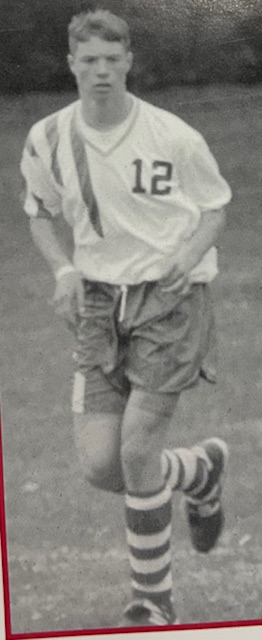A Yearbook Photo: Accepting Time’s Relentlessness
In his essay, “On the Shortness of Life” the ancient Greek philosopher Seneca writes:
“You are living as if destined to live forever; your own frailty never occurs to you; you don’t notice how much time has already passed, but squander it as though you had a full and overflowing supply – though all the while that very day which you are devoting to somebody or something may be your last.”
~~
A few weeks ago, I spent a weekend with some old high school friends, many of whom I’ve known for around 35 years. We’ve changed a lot over the years—some of us are graying, a few are bald, and a couple have struggled with their weight, yo-yoing up and down. Our bodies have their own tales to tell: some deal with achy knees, others have sore hips or creaky shoulders. As for me, I have a progressive brain disease. On good days, I manage with a cane, but on tougher days, I roll with a walker.
We blasted Rage Against the Machine, Counting Crows, and Pearl Jam as if they were fresh, new bands who just released their first albums. We quoted Forrest Gump, Dumb and Dumber, and Nicholas Cage’s Face/Off with the same enthusiasm as if it were Friday night and we were hanging out on the multiplex curb with popcorn butter on our lips, waiting for our moms to pick us up.
At one point during the weekend, a friend with shaggy salt-and-pepper hair said to me, half-joking and half-serious, “Jay, now that you’re retired, if you could figure out how to stop time, that would be amazing.”
The thing is–when you’re young, time feels like an afterthought, but one day you get older, and time suddenly becomes something you can’t ignore.
That weekend, my old friends and I pored over pictures from high school and college. One photo, in particular, sparked more stories and reflections than any other. It was a snapshot from New Year’s Eve 1999, showing a tangle of our friends, sitting on and around an old plaid couch, laughing at the camera.
I wasn’t in the picture. I was somewhere off-camera, lost in my own teenage nonsense. None of us remembered taking that picture or what those familiar kids were laughing at. But as we scanned the picture we just shook our heads and smiled at the familiar faces of those carefree kids on the couch.
~~
Our middle son, Chase, is starting high school and will be attending the same alma mater as Cindy and me. He’s also joining the soccer team, just like his dad did.
Here is his picture before his first game (2024):

Here is a picture of me playing in a game my senior year (1998):

Maybe because I’ve spent more time at my high school this week than I have in the 26 years since I have graduated but recently, I found myself dumbfounded by the relentless passage of time.
One recent evening, I sat on my porch, listening to the faint chirping of distant crickets. The late-summer sun cast long shadows over everything as it dipped below the horizon. I felt the ache of time in my hands and in my heart. After all the summers I’ve lived through, how could I still be so unaware of summer slipping away right before my eyes?
I pondered my friend’s question about finding a way to stop time. I thought deeply, long after the sun had set and the shadows had faded. In the end, I realized the truth: I couldn’t halt the passage of time. Stopping time is a concept that’s more at home in science fiction and fantasy than in reality. In literature and movies, characters might use magical artifacts or advanced technology to pause time. In real life, though, the passage of time is a constant and unchangeable force.
However I realized that stopping time isn’t about literally freezing the clock but about immersing ourselves fully in the present. By being present and mindful, we can extract the essence of each moment, inviting it into our fragile hands and ephemeral heart.
The truth is– time is relentless. Someday, we all become photos in a yearbook. And even though we can’t stop time, we can control how we experience it. By choosing to be present, we give ourselves the chance to live joyfully and meaningfully– like kids on a couch counting down time on New Year’s Eve.
In this way, stopping time becomes less about defying the laws of nature and more about acceptance.
Accept everything— Seneca to grunge music to Nicholas Cage movies— ages. Accepting that time will always and forever elapse. And accepting that it’s our very human job to acknowledge this and find contentment in its unyielding passage like a summer evening slipping into night.
Be well,
Jay
Are you writer? Are you looking for writing advice or writing tactics that you can guide you on your writing journey?

One, Line, One Love: Episode 32: A Conversation Between Two Everyday Writers
In this episode of “One, Line, One Love,” Gail and Jay dive into a thought-provoking line from Anthony De Mello’s Awareness, that begins “My business is to do my thing…”. They explore the challenges writers face in discovering and expressing their unique style and voice. Gail and Jay also share their personal experiences with developing a genuine commitment to the writing life. If you’re a writer grappling with your dedication to the craft, this episode is a must-listen!

Book Sale Link
~~
Warm greetings to everyone who found me on the University of Pennsylvania’s Ataxia Clinic’s website! Thanks for stopping by. I have ataxia and though I’m not a doctor, I hope my words comfort, encourage, empower, and serve as good company on your journey.

~~
Jay Armstrong is a speaker and an award-winning author. Despite being diagnosed with a rare neurological disease, that impairs his movement, balance, eyesight, and speech–Jay presses on. The leader of the Philadelphia Ataxia Support Group, he hopes to help you find joy, peace, and meaning in life.




